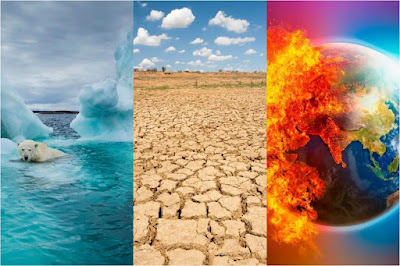GLOBAL WARMING
Global warming is the long-term heating of Earth's climate system observed since the pre-industrial period (between 1850 and 1900) due to human activities, primarily fossil fuel burning, which increases heat-trapping greenhouse gas levels in Earth's atmosphere. The term is frequently used interchangeably with the term climate change, though the latter refers to both human- and naturally produced warming and the effects it has on our planet. It is most commonly measured as the average increase in Earth's global surface temperature.
Since the pre-industrial period, human activities are estimated to have increased Earth's global average temperature by about 1 degree Celsius (1.8 degrees Fahrenheit), a number that is currently increasing by 0.2 degrees Celsius (0.36 degrees Fahrenheit) per decade. Most of the current warming trend is extremely likely (greater than 95 percent probability) the result of human activity since the 1950s and is proceeding at an unprecedented rate over decades to millennia.
Causes of Global Warming
The primary cause of global warming is the human emission of greenhouse gases such as carbon dioxide, methane, and nitrous oxide. These gases trap heat in Earth's atmosphere, causing it to warm. Greenhouse gases are released into the atmosphere from a variety of sources, including burning fossil fuels for electricity, heat, and transportation; deforestation; and industrial processes.
Other human activities that contribute to global warming include:
- Agriculture: Livestock production releases methane, a potent greenhouse gas.
- Land use change: Deforestation and other land use changes release carbon dioxide into the atmosphere.
- Cement production: The production of cement releases carbon dioxide.
- Waste disposal: The disposal of waste in landfills releases methane.
Effects of Global Warming
Global warming is already having a significant impact on Earth's climate and environment. These impacts include:
- Rising sea levels: As the oceans warm, they expand, causing sea levels to rise. This is already inundating coastal areas and displacing millions of people.
- More extreme weather events: Global warming is making extreme weather events, such as heat waves, droughts, floods, and wildfires, more common and more severe.
- Changes in precipitation patterns: Global warming is changing precipitation patterns, making some areas wetter and others drier. This is disrupting agriculture and ecosystems.
- Melting glaciers and ice sheets: Glaciers and ice sheets are melting at an alarming rate due to global warming. This is raising sea levels and threatening freshwater supplies.
- Loss of biodiversity: Global warming is causing the extinction of plant and animal species at an alarming rate. This is disrupting ecosystems and threatening food security.
- Human health impacts: Global warming is increasing the risk of heat-related illnesses, respiratory problems, and vector-borne diseases.
Mitigation and Adaptation
There are a number of things that can be done to mitigate and adapt to global warming. Mitigation refers to reducing greenhouse gas emissions, while adaptation refers to adapting to the impacts of climate change that are already happening or are likely to happen in the future.
Some of the key mitigation strategies include:
- Reducing our reliance on fossil fuels and transitioning to renewable energy sources, such as solar and wind power.
- Improving energy efficiency in our homes, businesses, and transportation systems.
- Planting trees, which absorb carbon dioxide from the atmosphere.
- Developing carbon capture and storage technologies.
- Investing in research and development of new technologies that can help to reduce greenhouse gas emissions.
Some of the key adaptation strategies include:
- Building seawalls and other infrastructure to protect coastal areas from rising sea levels.
- Developing drought-resistant crops and water conservation measures.
- Relocating people and infrastructure away from areas that are at high risk of climate change impacts.
- Developing early warning systems for extreme weather events.
- Increasing funding for disaster relief.
Conclusion
Global warming is a serious threat to our planet and our way of life. It is important to take action to mitigate and adapt to climate change in order to protect our future.
References
- Intergovernmental Panel on Climate Change: https://www.ipcc.ch/
- National Oceanic and Atmospheric Administration: https://www.noaa.gov/
- U.S. Environmental Protection Agency: https://www.epa.gov/climate-change
Additional Information
- The following are some of the organizations that are working to address global warming:
- The Intergovernmental Panel on Climate Change (IPCC) is the leading international body for the assessment of climate change.
- The United Nations Framework Convention on Climate Change (UNFCCC) is an international treaty that aims to stabilize greenhouse gas concentrations in the

.jpeg)


Comments